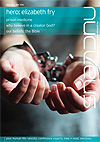Laurence Crutchlow examines one of CMF's core values.
'To maintain the deepest respect for human life from its beginning to its end, including the unborn, the handicapped and the elderly'
The value of human life confuses society. Strict laws on murder, public distress at the death of soldiers and costly efforts to save the lives of the sick co-exist with abortion, pressure to legalise euthanasia, and tolerance of preventable early deaths in those with mental illness. (1)
We place great emphasis on human dignity and rights, with autonomy valued highly. Yet this same autonomy is often used to argue for interventions such as assisted suicide, which prematurely end life and give the message that certain lives are better ended than improved.
Other societies have seen terrifying consequences when the value of human life has been diminished. I recently visited an exhibition called Topography of Terror, (2) sited where a major Nazi office had operated in Berlin. Some of the well-known history of the regime was documented, but I was struck by a panel detailing centres set up (mostly at psychiatric hospitals) to fulfil a 'euthanasia' program, where those judged to be incurably sick could be 'granted mercy death'. Displays included the bland (and untruthful) letters sent to parents whose children had died this way.
More than 70,000 people were killed this way during the first two years of WWII. Even this is enough to appal most advocates of legal euthanasia. But the effects didn't stop there.
Dr Leo Alexander, a medical consultant at the Nuremberg trial of Nazi doctors takes up the story. 'Whatever proportions these crimes finally assumed, it became evident to all who investigated them that they had started from small beginnings. The beginnings at first were merely a subtle shift in emphasis in the basic attitude of the physicians. It started with the acceptance of the attitude, basic in the euthanasia movement, that there is such a thing as life not worthy to be lived. This attitude in its early stages concerned itself merely with the severely and chronically sick. Gradually, the sphere of those to be included in this category was enlarged to encompass the socially unproductive, the ideologically unwanted, the racially unwanted and finally all non-Germans. But it is important to realise that the infinitely small wedged-in lever from which this entire trend of mind received its impetus was the attitude toward the nonrehabilitable sick.' (3)
Nazi Germany is sometimes seen as an extreme example, but we don't have to go back to such horrors to see that small changes in how we value human life can lead to bigger shifts later. Was there really any expectation in Belgium when euthanasia was legalised, that this 'right' would be extended to children, as has now happened? (4)
why value human life?
There is a clear difference between humans and the rest of creation. 'God created mankind in his own image' (Genesis 1:27), is an extraordinary claim. God goes on to say that man will rule over the earth, and over the other things created. Indeed instead of 'God saw that it was good' in the first days of creation, verse 31 says 'God saw all that he had made, and it was very good' (italics mine). Placing a creature in his own image to rule over the earth seems to be the pinnacle of creation for God. Later, the image of God alone is the basis for outlawing intentional killing: 'Whoever sheds human blood by humans shall their blood be shed; for in the image of God has God made mankind.' (Genesis 9:6)
The story doesn't stop with creation. Despite the fall of humans when they disobeyed God, Jesus still came to earth in fully human form. The difference was that he was a new, unfallen man; coming from heaven instead of from the dust of the earth (1 Corinthians 15:47). He obeyed God throughout his time on earth. His death on the cross was not due to his own sin, but in atonement for ours. God gave Jesus up to his death (John 3:16); it was no accident. God places such high value on humans that he sent his only Son to die for them. So Jesus not only dignified the human form by coming to earth as a man, he proved the immense value of humans to God as he died in our place.
The Bible doesn't give exceptions to this. Jesus wasn't in the form of some humans but not others. If anything, the vulnerable groups often devalued in society seem to be singled out by Jesus for attention; he spent time with (and spoke highly of) children (Matthew 18:1-4), and repeatedly healed the sick, including some very difficult cases (Mark 5:1-5).
why is this CMF value worded in this way?
Some may criticise our wording of this value for being vague. This value doesn't clearly define the exact moment that life begins and ends. Defining death used to be simple – someone had died if they had stopped breathing and their heart had stopped beating. But what about when a patient's circulation and breathing have been taken over by machinery? Are they still alive, even though they cannot breathe for themselves? Criteria for diagnosing brainstem death are used but can be complex; the latest version of A Code of Practice for the Diagnosis and Confirmation of Death (5) runs to over 40 pages. The concept of brainstem death itself is not without controversy, which has been covered before in CMF literature. (6)
Defining the beginning of life is also controversial. The World Medical Association's Declaration of Geneva has progressively been amended, initially stating 'I will maintain the utmost respect for human life from the time of conception' in 1948, changing to 'from its beginning' in 1994, and now reading blandly 'I will retain the utmost respect for human life' in the current version. (7) (8)
Disagreement exists even among Christian doctors. Clearly God does know for sure when life begins, even if we do not, but the Bible does not give us this information explicitly. Most (but not all) CMF members would hold that life begins at 'conception'. But some would hold that conception is not 'complete' until the developing embryo has implanted in the uterine wall. But if uncertain, surely it is safer to err on the side of caution, giving full protection to life from the moment of fertilisation (when a new genetically distinct organism comes into being), even without complete certainty over God's mind on the matter. Though by using 'beginning' in this statement CMF does not as a whole take a firm position, this is not intended to mean that all views are equally true; life cannot begin at both fertilisation and implantation.
The unborn, handicapped and elderly are deliberately cited here because these groups commonly seem to be those where society questions whether respect for human life still applies. The term 'handicapped' does rather reflect the time in which these words were written – physically impaired or disabled would probably be a more modern term.
how will our response look in practice?
These issues are serious. But fervent defence of human life can be perceived as cold and uncompassionate. No to abortion, no to euthanasia. No to embryo research. An apparently harsh and uncaring attitude to embryo research may be devastating to parents who carry genes that will pass on a condition to their child that might be fatal. A flat refusal to help will deepen the distress of a teenage girl who has an unwanted pregnancy.
It isn't enough for us simply to oppose and campaign against practices that diminish respect for human life (though we do need to do this!). We need to develop responses that both respect human life and point towards Jesus – after all it is him that someone suffering really needs. A firm 'no' alone will rarely do both things.
For example abortion is not the only option in unwanted pregnancy. Crisis pregnancy centres allow for counselling and practical support. The recent Home for Good initiative (9) encourages Christians to get involved in adoption.
Christian pioneers such as Dame Cicely Saunders were key to the development of palliative care in the second half of the twentieth century. Good palliative care ensures that no patient should die in pain – surely a much better response to chronic pain than offering to kill the patient.
what can a student do?
As well as perhaps giving time to groups which provide some of the practical solutions suggested above, conversations with colleagues and friends do provide opportunities. The value of human life comes up quite naturally – whether over a dissection table or dealing with dying patients.
But above all, the way in which we relate to vulnerable patients is most powerful in showing others our respect for human life. Avoiding comments and conversations that denigrate these patients is important; the way in which we speak to and care for them is also important. If this aspect isn't right, it is unlikely that we will get a hearing for much else we say.
So respect for human life works out in a number of ways for CMF; some of these are very public, with statements in the media and work in parliament. Others are academic, where good arguments are put forward in publications. But all are underpinned as CMF members value human life in its most vulnerable forms in day-to-day medical study and practice.
































